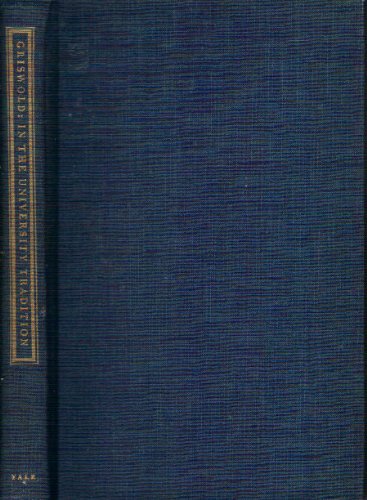Background
Griswold was born on October 27, 1906, in Morristown, New Jersey, the son of Harold Ely Griswold, an insurance broker, and Elsie Montgomery Whitney.



(A collection of thoughtful essays and addresses, written ...)
A collection of thoughtful essays and addresses, written on sundry topics and occasions, mostly academic, by Alfred Whitney Griswold, then-President of Yale University.
https://www.amazon.com/University-Tradition-Alfred-Whitney-Griswold/dp/B0007HES1I?SubscriptionId=AKIAJRRWTH346WSPOAFQ&tag=prabook-20&linkCode=sp1&camp=2025&creative=165953&creativeASIN=B0007HES1I

(Book by Griswold, Alfred Whitney)
Book by Griswold, Alfred Whitney
https://www.amazon.com/Liberal-Education-Democratic-Ideal-Essays/dp/0837189772?SubscriptionId=AKIAJRRWTH346WSPOAFQ&tag=prabook-20&linkCode=sp1&camp=2025&creative=165953&creativeASIN=0837189772
Griswold was born on October 27, 1906, in Morristown, New Jersey, the son of Harold Ely Griswold, an insurance broker, and Elsie Montgomery Whitney.
After receiving his secondary education at the Peck School in Morristown and at the Hotchkiss School in Lakeville, Connecticut, Griswold entered Yale University in 1925, preparatory to a career as a writer or journalist. As an undergraduate he achieved an excellent academic record, wrote regular columns and light verse for the Yale Daily News, and served as managing editor of the Yale Record. He was also one of the founders of a literary society called the "Mountain. " In 1929 he received the B. A. in English.
Griswold accepted a position as a clerk for a Wall Street brokerage firm in the summer of 1929. But the financial world did not attract him, and and he returned to Yale in the fall to teach freshman English while doing graduate work in the English department. In the summer of 1930, he studied in Germany. Upon resuming his graduate program in the fall, he switched to the history department and completed his Ph. D. in 1933. Later that year Griswold became an instructor in history at Yale, but his rise through the academic ranks was not meteoric. In 1935 he was appointed research assistant in international relations; in 1938, after the publication of his first book, he was promoted to assistant professor in government and international relations; in 1942 he was named associate professor of history; and in 1947 he became professor of history. A popular figure on campus, Griswold gained a reputation as an outstanding lecturer who spiced his material with amusing anecdotes and the mimicry of historical personalities. He did most of his scholarly writing during the 1930's and 1940's. His first publication, an article on the New Thought movement of the early twentieth century, entitled "New Thought: A Cult of Success, " appeared in the American Journal of Sociology in November 1934. It had been a part of his doctoral dissertation. During World War II Griswold served as director of the Foreign Area and Language Curriculum of the Army Specialized Training Program and as director of the Army Civil Affairs Training School at Yale, handling both assignments skillfully. But he had not prepared himself for administrative work and had no great interest in it. Thus it came as a great surprise to him and to his associates when in February 1950 the Yale Corporation appointed him the sixteenth president of the university. Despite his lack of experience, Griswold was a successful university president. Within ten years he had tripled the university's endowment and doubled faculty salaries. He was a stout defender of academic freedom and a vigorous opponent of loyalty oaths. Alarmed at contemporary trends, Griswold deplored the emphasis on sports at major universities and assailed the national traffic in athletic scholarships as "one of the greatest educational swindles ever perpetrated on American youth. " As a teacher and scholar who knew what was pedagogically sound, he attacked the "service station" concept of higher education wherein colleges and universities hastened to offer whatever courses outside pressure groups urged upon them. He also believed that teachers' colleges did a miserable job. He often referred to the paucity of resources spent on the nation's secondary schools and their deficient academic programs as a national scandal. If Griswold's scholarship manifested painstaking research, his administrative work reflected concern for quality over numbers and for the liberal arts tradition over technological instruction. He died in New Haven, Connecticut, on April 19, 1963.
(A collection of thoughtful essays and addresses, written ...)
(Book by Griswold, Alfred Whitney)
During the 1940's Griswold's work focused mainly on United States foreign relations. In articles for scholarly journals and learned magazines and in The Far Eastern Policy of the United States (1938) he examined American policy toward Eastern Asia. He saw this policy as inherently flawed because a variety of uncontrollable factors undermined its main thrust, which was support of the Open Door in China. During World War II Griswold wrote essays on German expansionism and on other aspects of German history. By the end of the war his main interest was in the wellsprings of American democracy, and his attention shifted to study of Thomas Jefferson and the United States agrarian tradition. In 1948 he published Farming and Democracy.
President of Yale University (1950-1963)
Griswold married Mary Morgan Brooks on June 10, 1930. They had four children.
